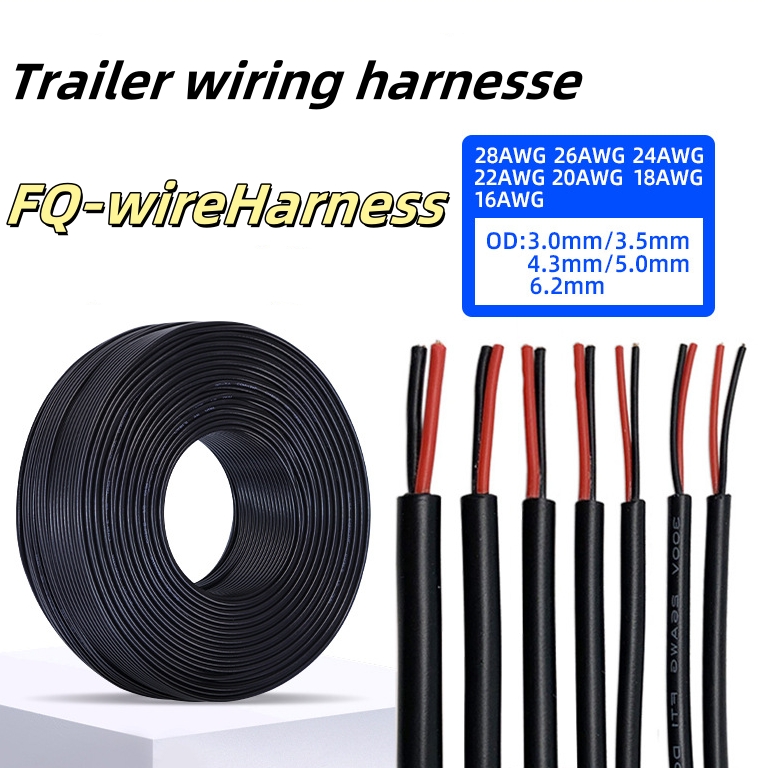Are you planning to tow a trailer? Then, you’ll need a trailer wiring harness. This essential component ensures that your trailer’s lights, brakes, and other electrical systems function correctly, enhancing safety on the road.
In this article, we’ll explore the different types of trailer wiring harnesses, their features, and how to choose the right one for your needs.

Features of a trailer wiring harness
Trailer wiring harnesses come with various features that determine their functionality and compatibility with different vehicles and trailers. Some common features of trailer wiring harnesses include:
– Connector type: The type of connectors used in a trailer wiring harness determines its compatibility with different vehicles and trailers. Common connector types include flat, round, and rectangular connectors.
– Wire gauge: The wire gauge used in a trailer wiring harness determines its current-carrying capacity and resistance to heat and abrasion. Thicker wires can carry more current and are more resistant to damage.
– Length: The length of a trailer wiring harness determines its flexibility and ease of installation. Longer wiring harnesses can be routed around obstacles and provide more flexibility in trailer positioning.
– Weatherproofing: Weatherproofing features, such as heat shrink tubing and sealed connectors, protect the wiring harness from moisture and corrosion.
– Color coding: Color-coded wires and connectors make it easier to identify and connect the wiring harness correctly.
How to choose the right trailer wiring harness
Choosing the right trailer wiring harness is crucial for ensuring safe and reliable towing. Here are some factors to consider when selecting a trailer wiring harness:
– Vehicle and trailer compatibility: The trailer wiring harness should be compatible with both the towing vehicle and the trailer. Check the wiring configuration and connector type of both vehicles before purchasing a wiring harness.
– Towing capacity: The trailer wiring harness should be rated for the towing capacity of the vehicle. A wiring harness that is not rated for the towing capacity of the vehicle can cause electrical problems and even damage to the vehicle.
– Features: Consider the features of the trailer wiring harness, such as the number of connectors, wire gauge, and weatherproofing. Choose a wiring harness with the features that meet your needs and budget.
– Installation: Consider the ease of installation of the trailer wiring harness. Some wiring harnesses require professional installation, while others can be installed by the user.
– Price: Trailer wiring harnesses come in various price ranges. Consider the cost of the wiring harness and its features before making a purchase.
Choosing the right trailer wiring harness is crucial for ensuring safe and reliable towing. Consider the compatibility, towing capacity, features, installation, and price when selecting a wiring harness.
Maintenance and care of trailer wiring harnesses
Proper maintenance and care of your trailer wiring harness can extend its lifespan and ensure safe towing. Here are some tips for maintaining and caring for your trailer wiring harness:
– Inspect regularly: Regularly inspect the wiring harness for signs of wear, damage, or corrosion. Look for frayed wires, cracked or broken connectors, and signs of moisture intrusion.
– Clean: Keep the wiring harness clean by removing dirt, debris, and other contaminants. Use a soft brush or cloth to clean the connectors and wires, and avoid using harsh chemicals or solvents that can damage the wiring.
– Protect from moisture: Moisture can cause corrosion and damage to the wiring harness. Protect the wiring harness from moisture by using weatherproof connectors and sealing any exposed wires or connectors with heat shrink tubing or electrical tape.
– Store properly: When not in use, store the wiring harness properly to prevent damage. Coil the wiring harness loosely and avoid kinking or twisting the wires. Store the wiring harness in a dry, cool place away from direct sunlight and heat sources.
– Use a wiring harness cover: A wiring harness cover can protect the wiring harness from dirt, debris, and moisture when not in use. Choose a cover that is compatible with your wiring harness and provides adequate protection.
– Avoid overloading: Overloading the towing vehicle can cause damage to the wiring harness and other electrical components. Ensure that the towing vehicle is not overloaded and that the trailer is within the towing capacity of the vehicle.
By following these tips, you can maintain and care for your trailer wiring harness, extending its lifespan and ensuring safe towing.
Conclusion
A trailer wiring harness is an essential component for towing trailers safely and reliably. Choosing the right wiring harness depends on various factors, including vehicle and trailer compatibility, towing capacity, features, installation, and price.
Proper maintenance and care of the wiring harness can extend its lifespan and ensure safe towing. By following the tips outlined in this article, you can choose the right trailer wiring harness for your needs and keep it in good condition for years to come.













